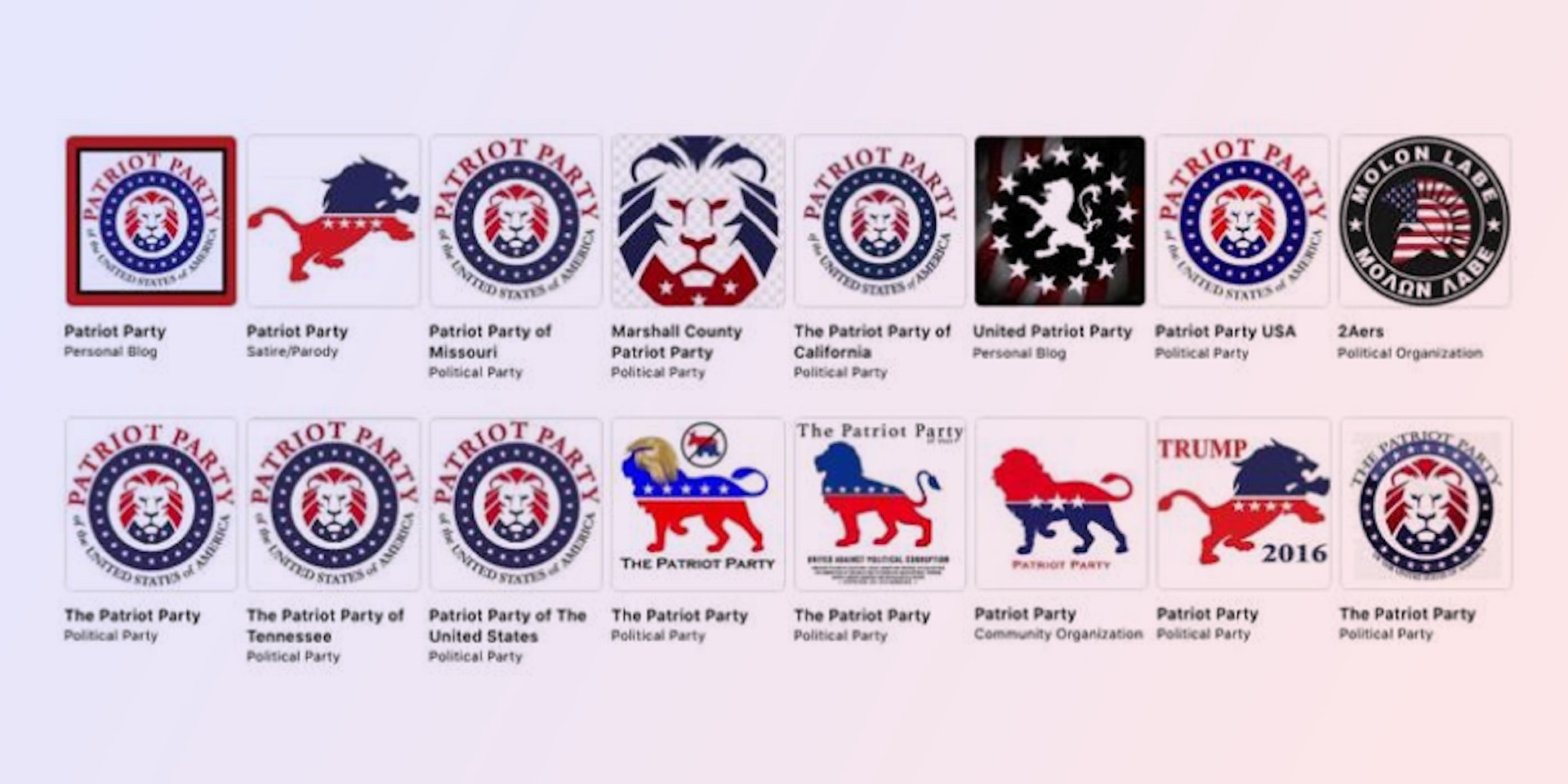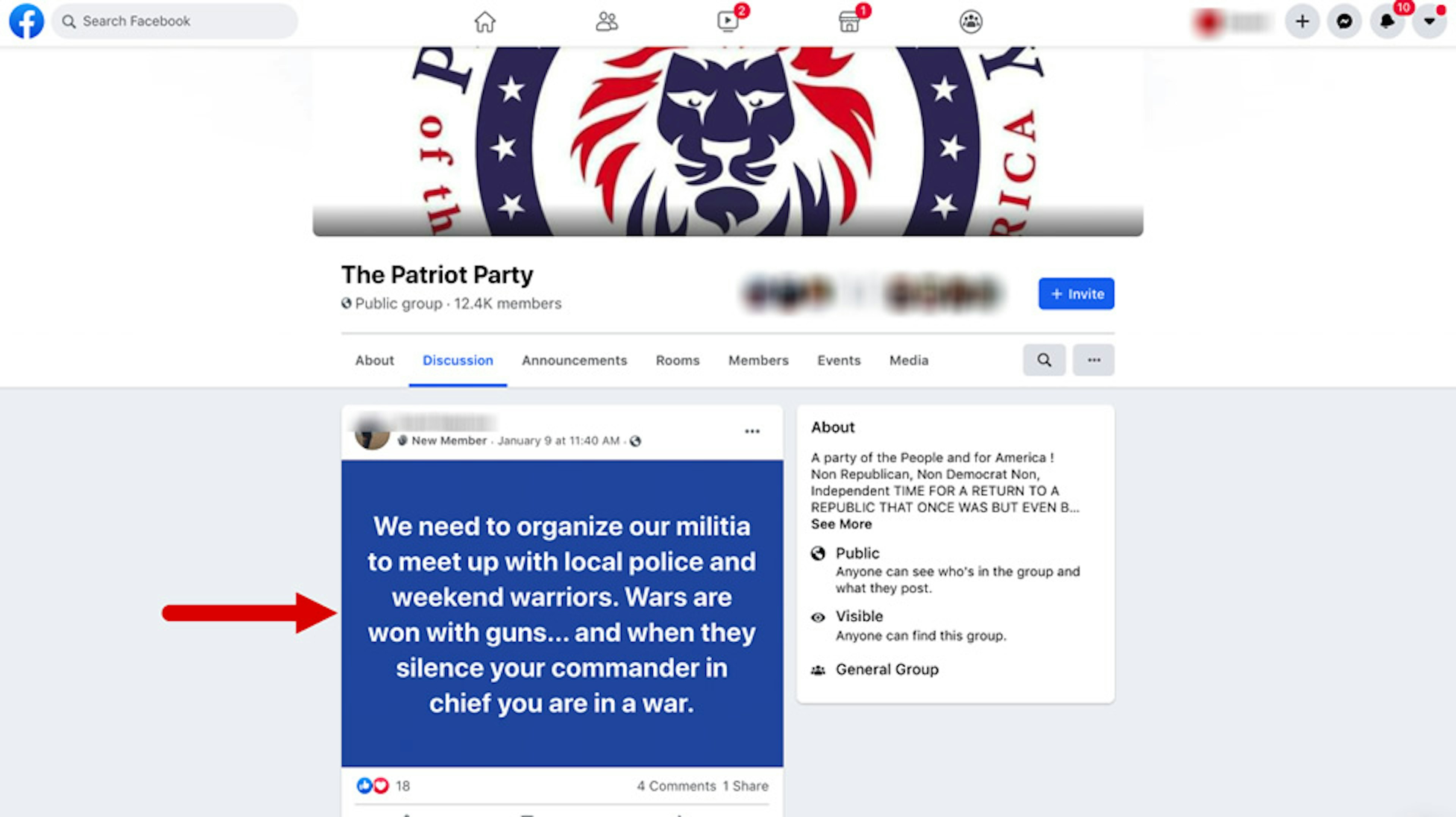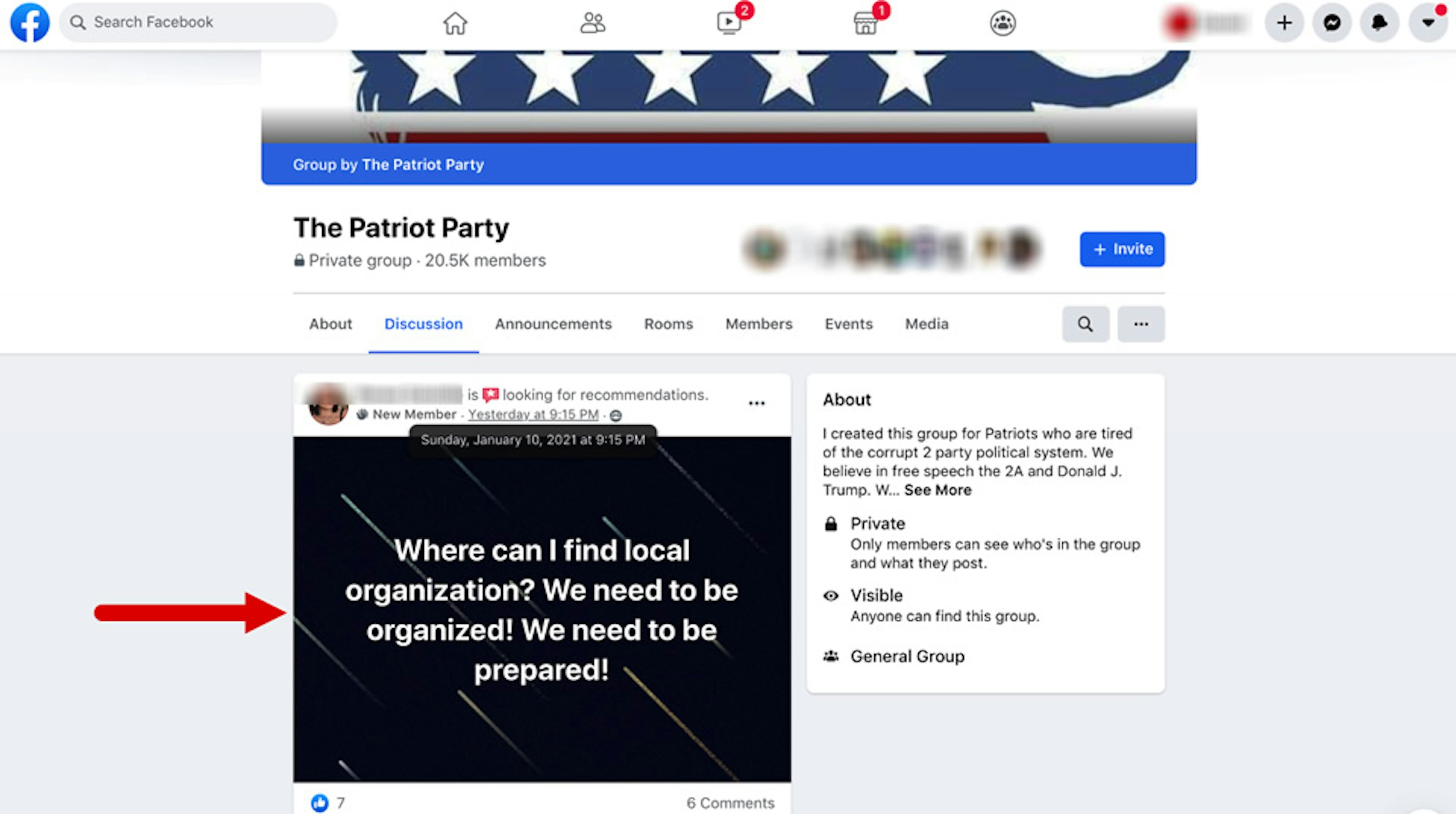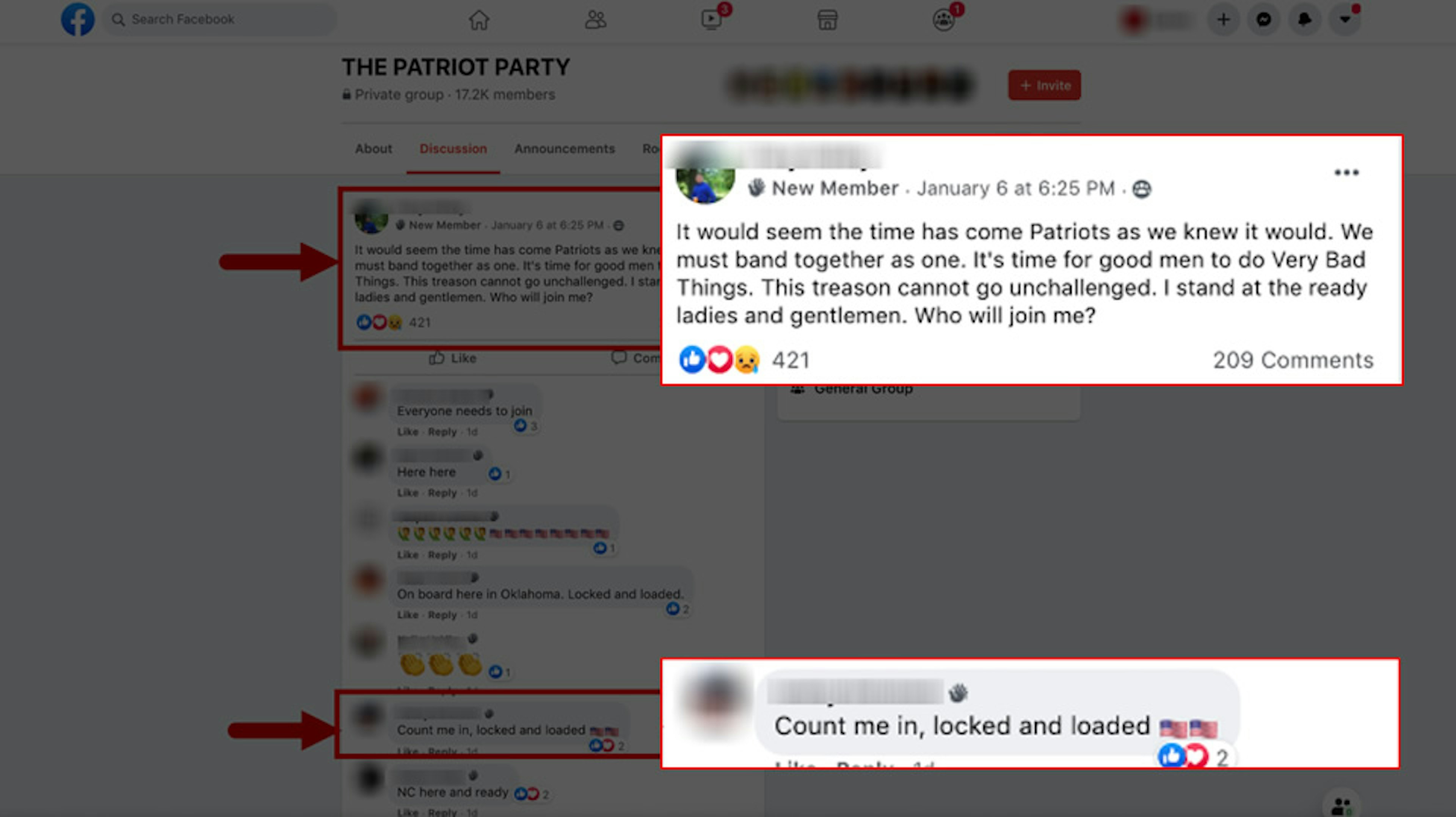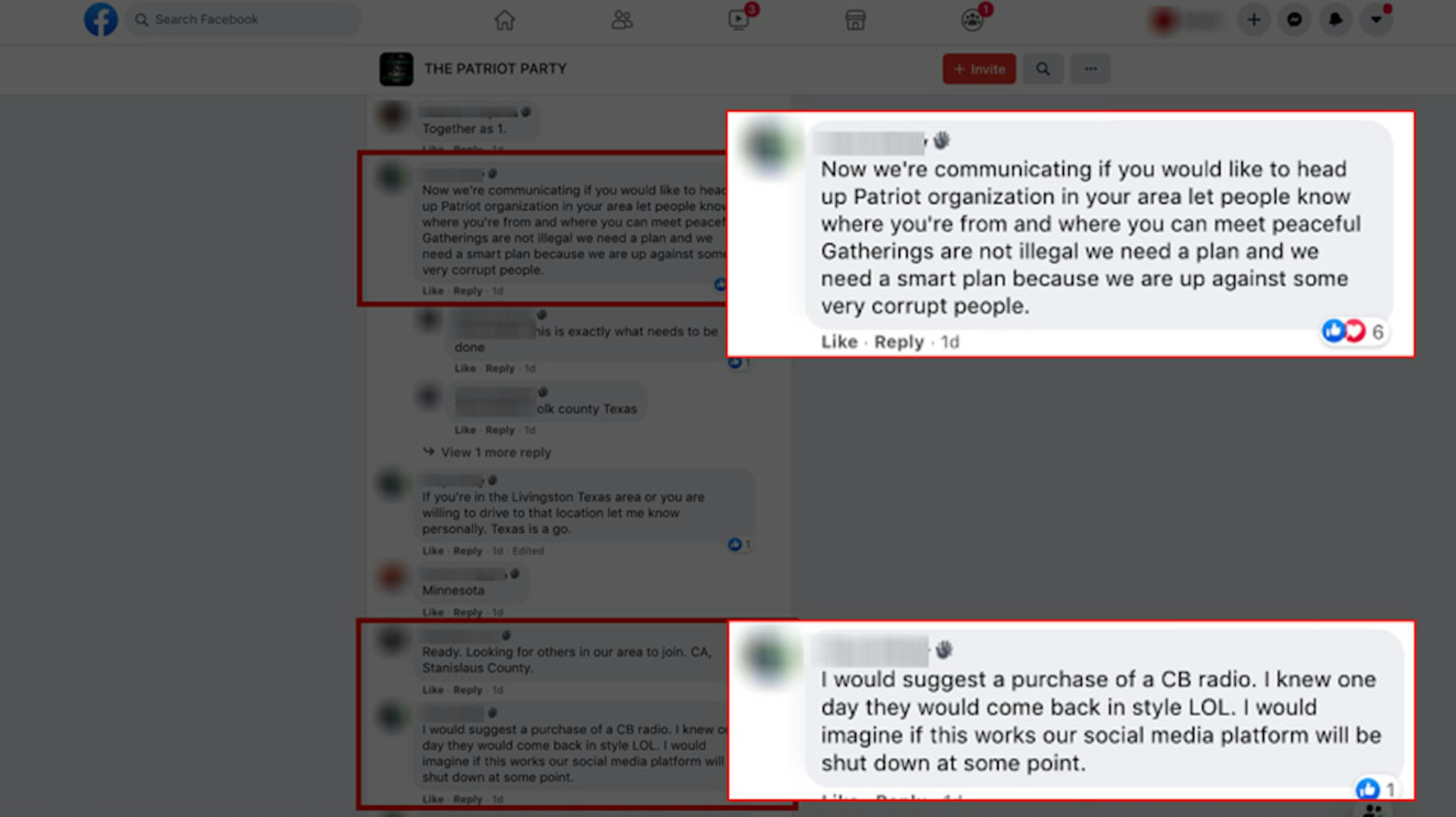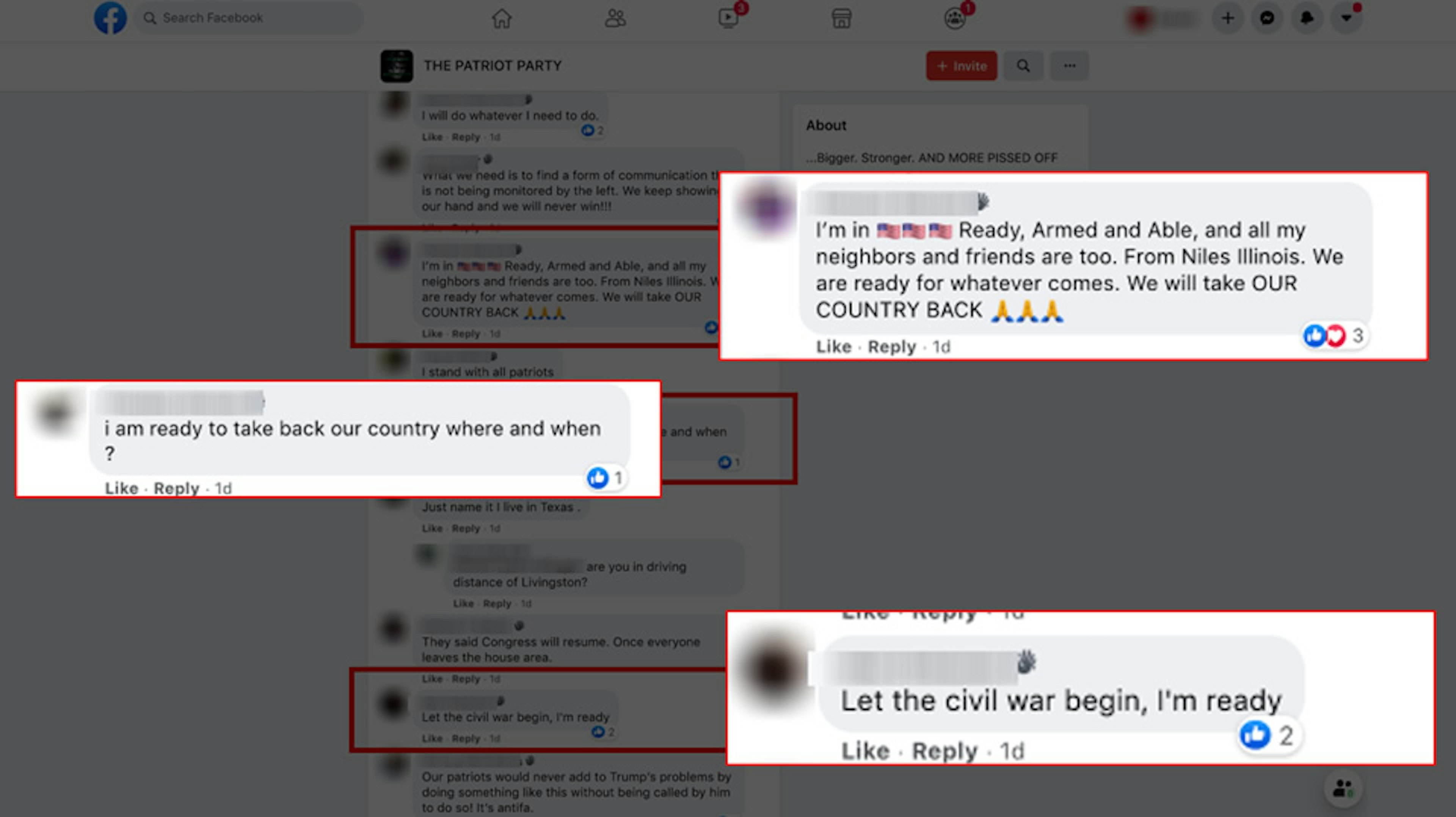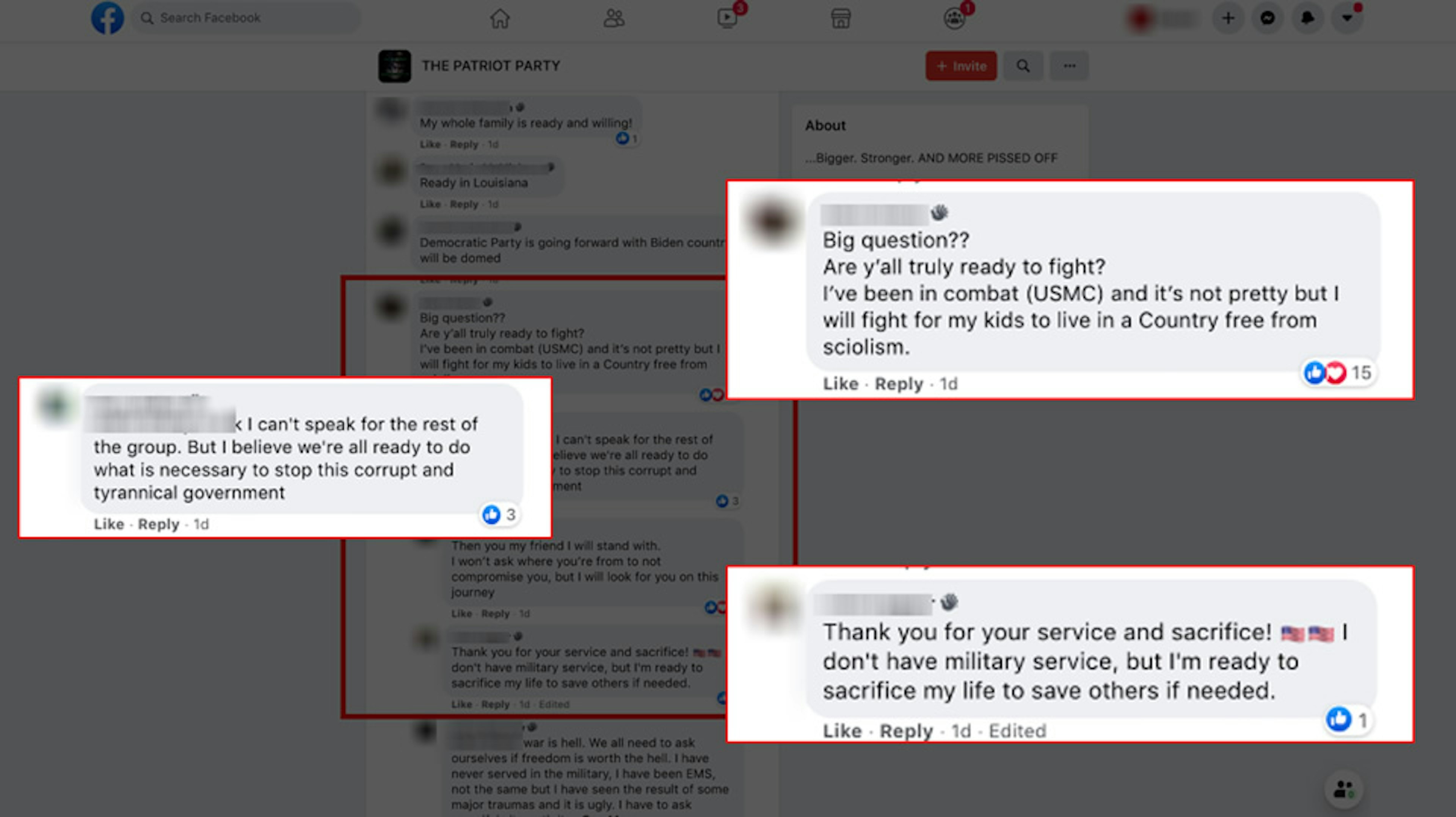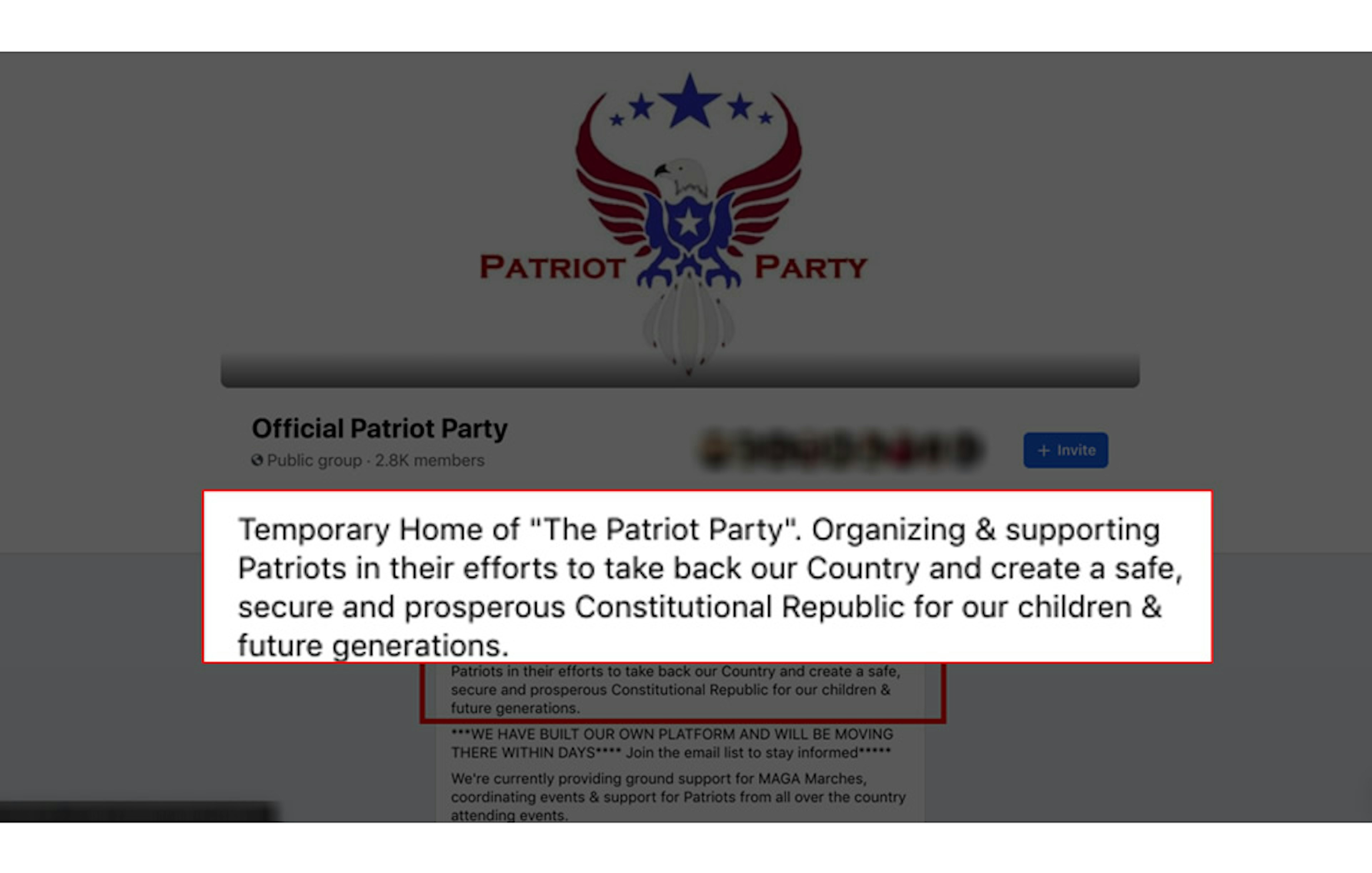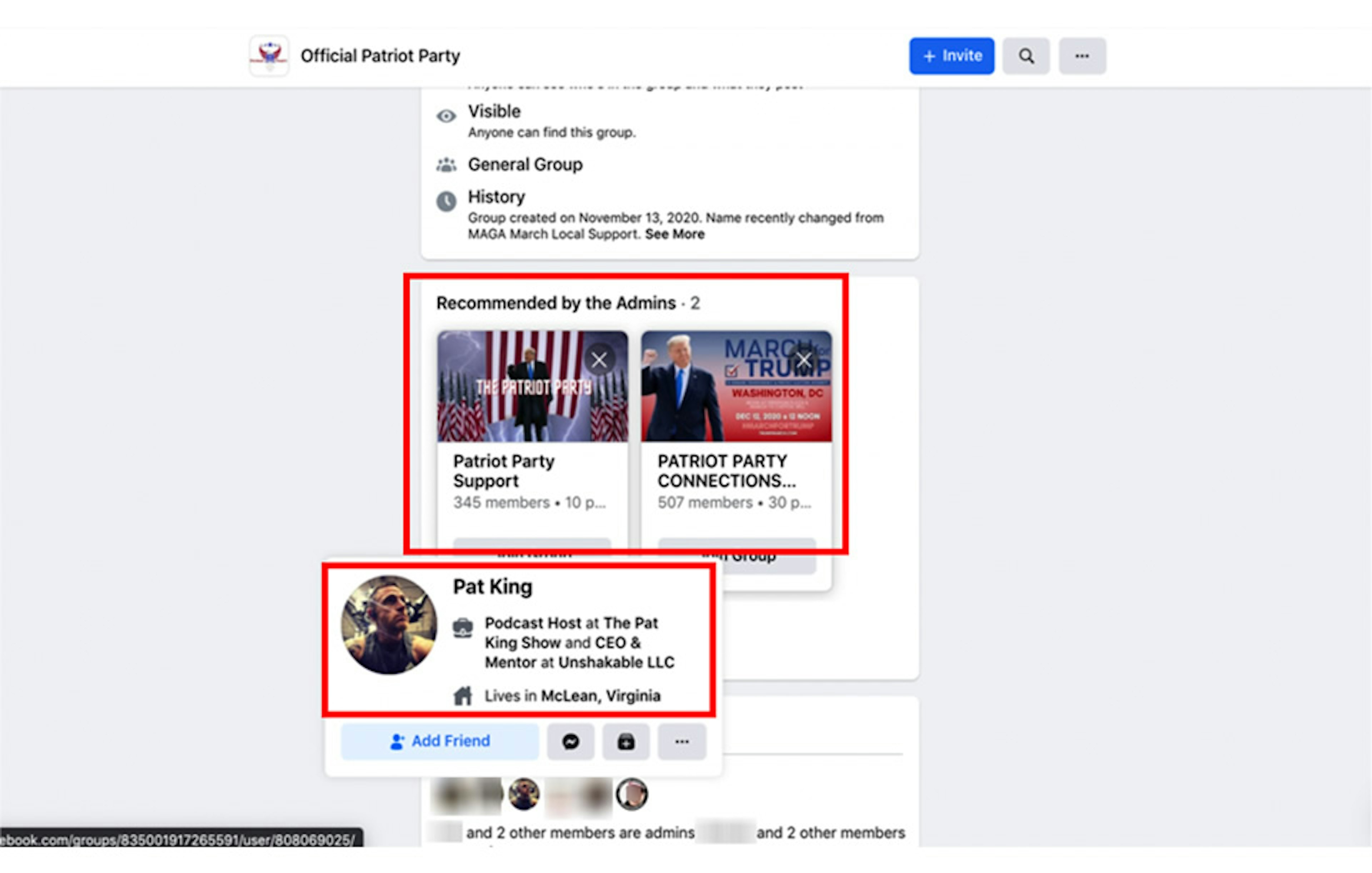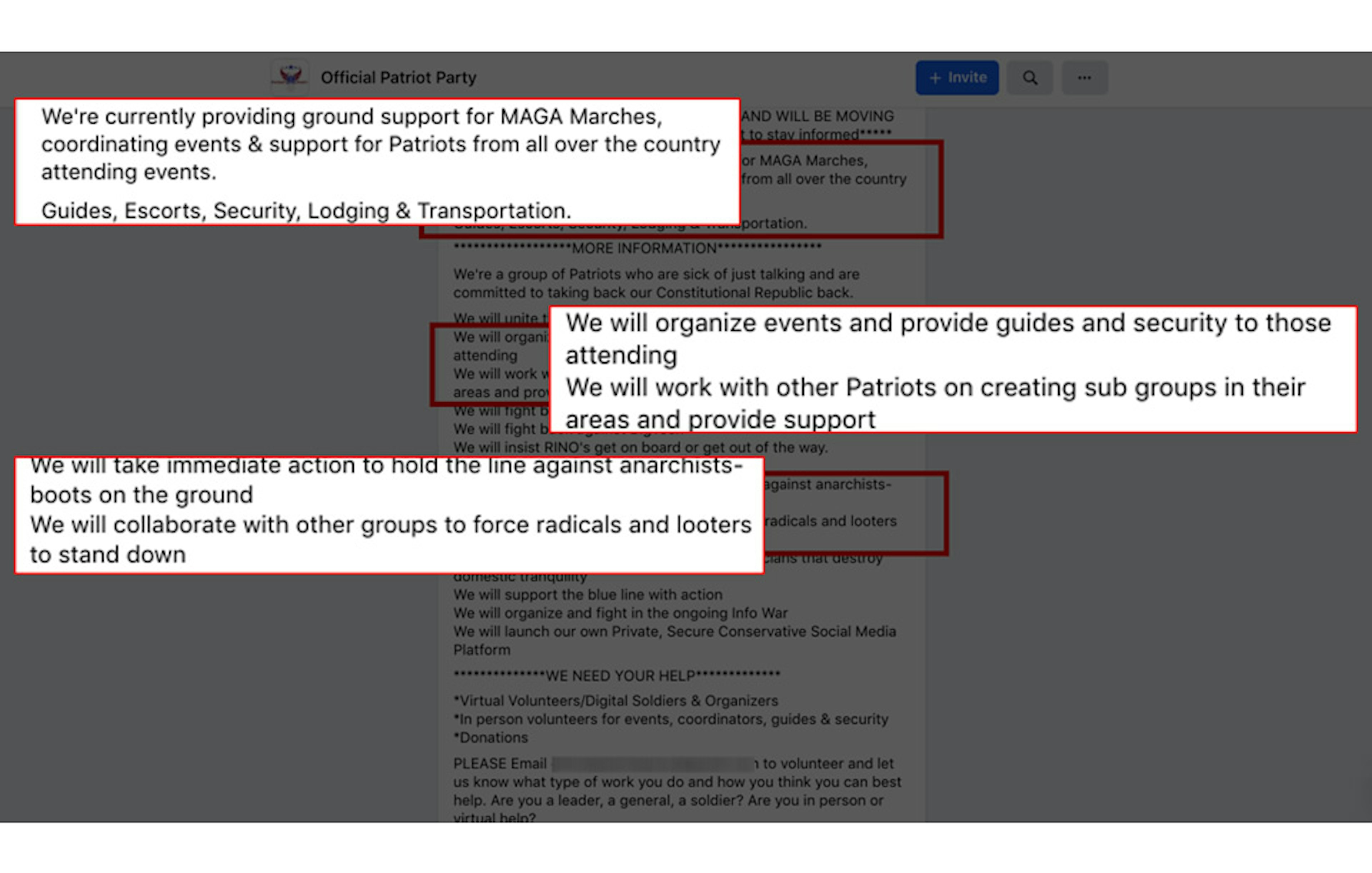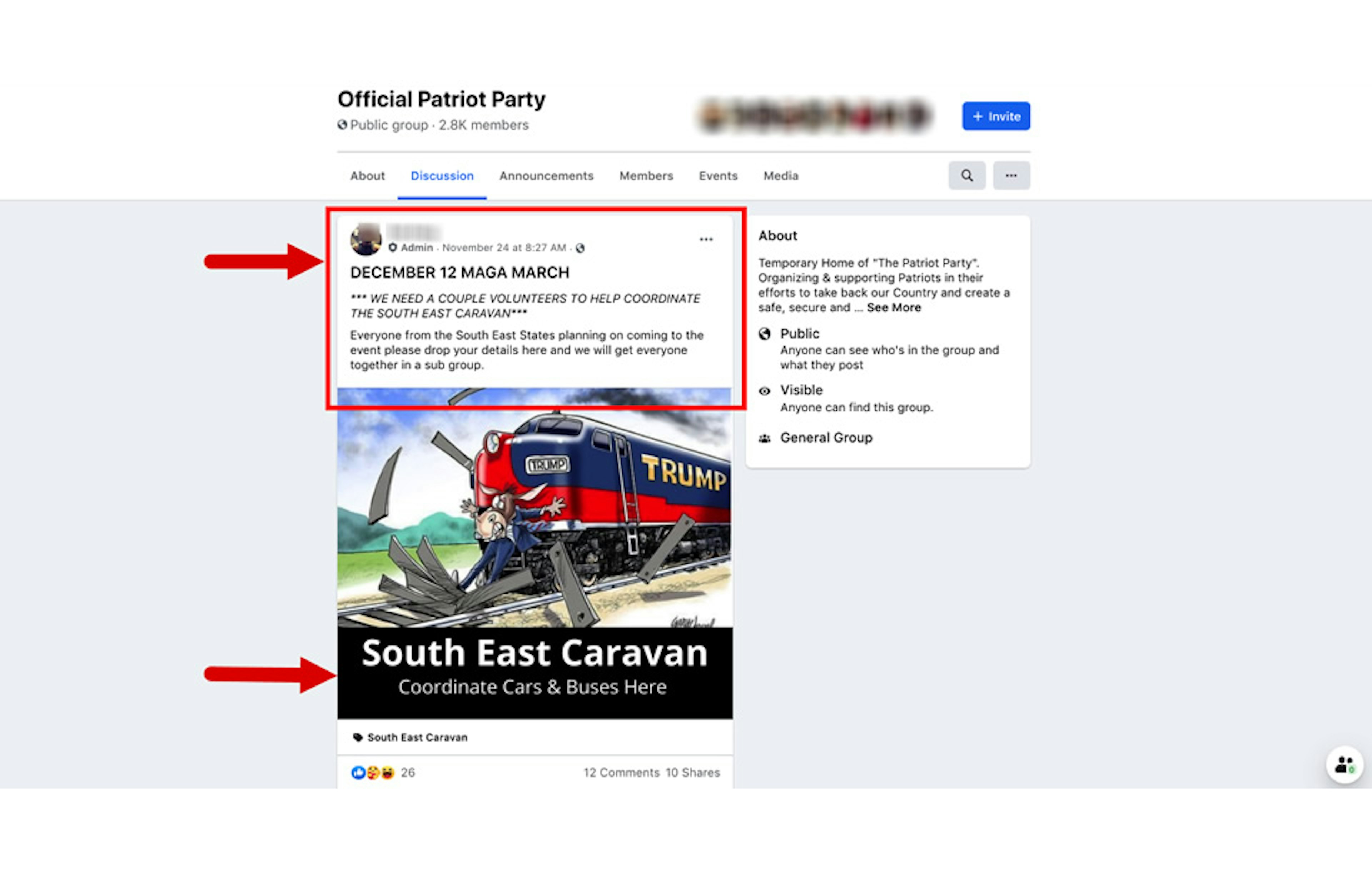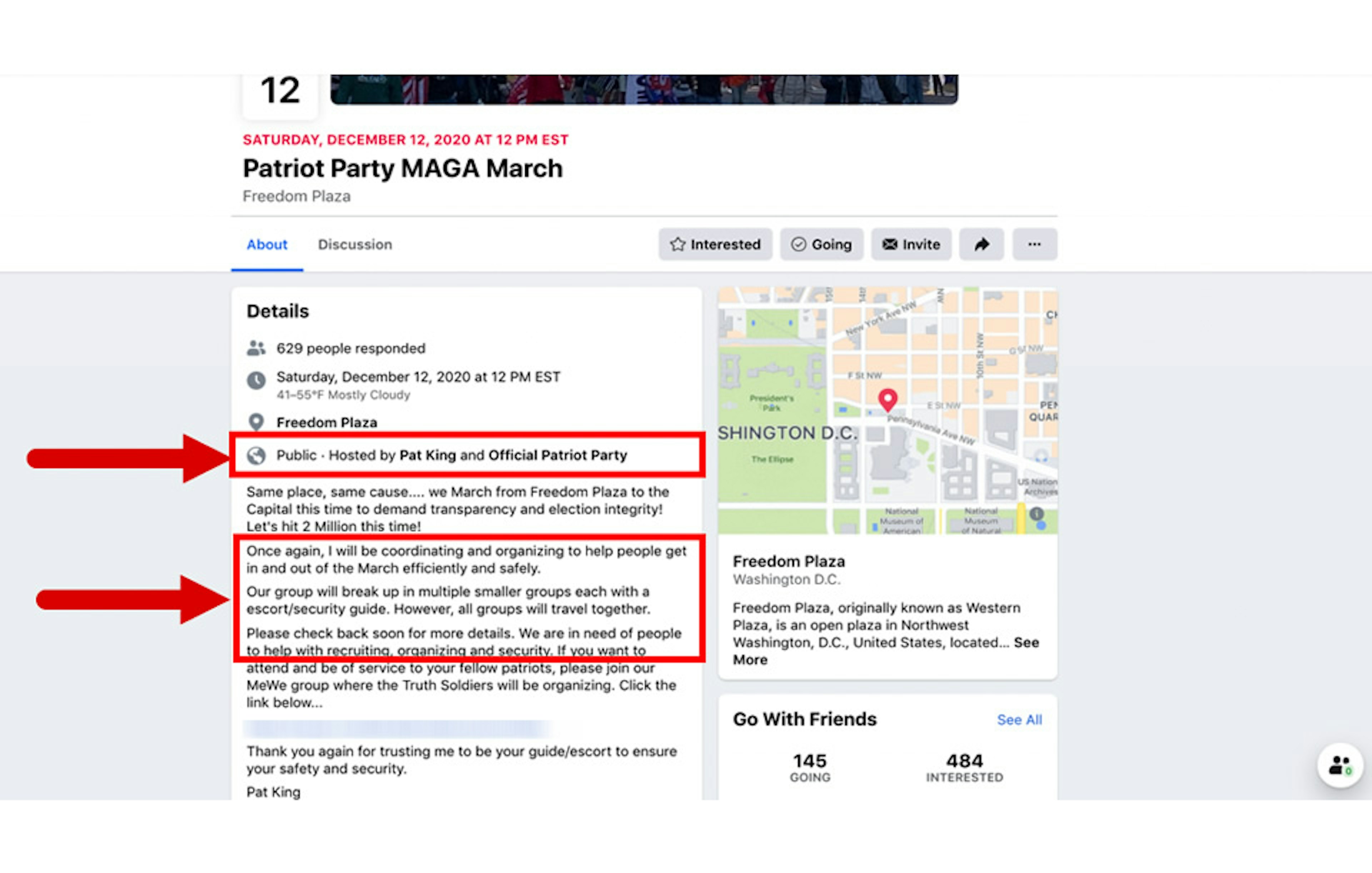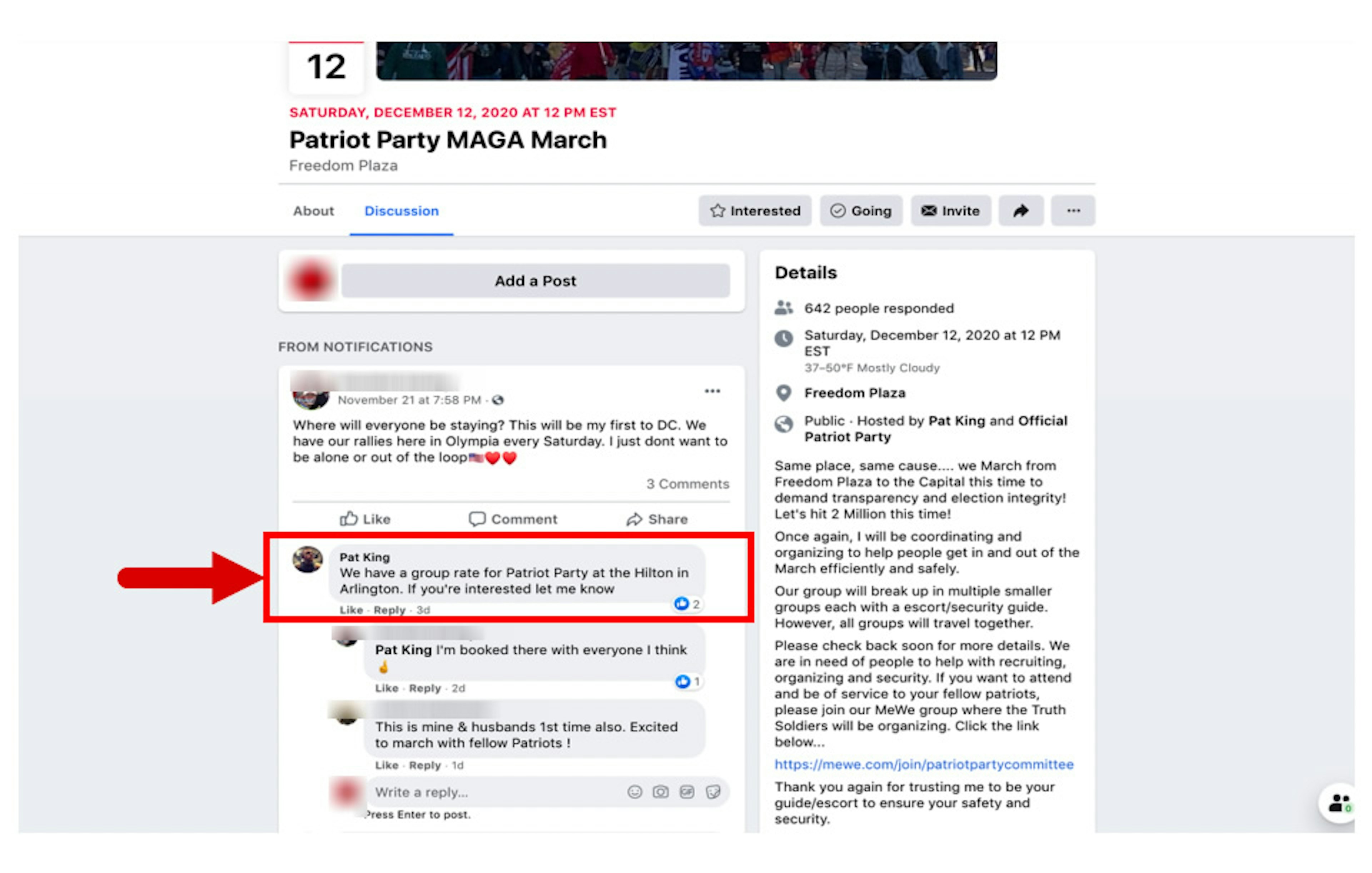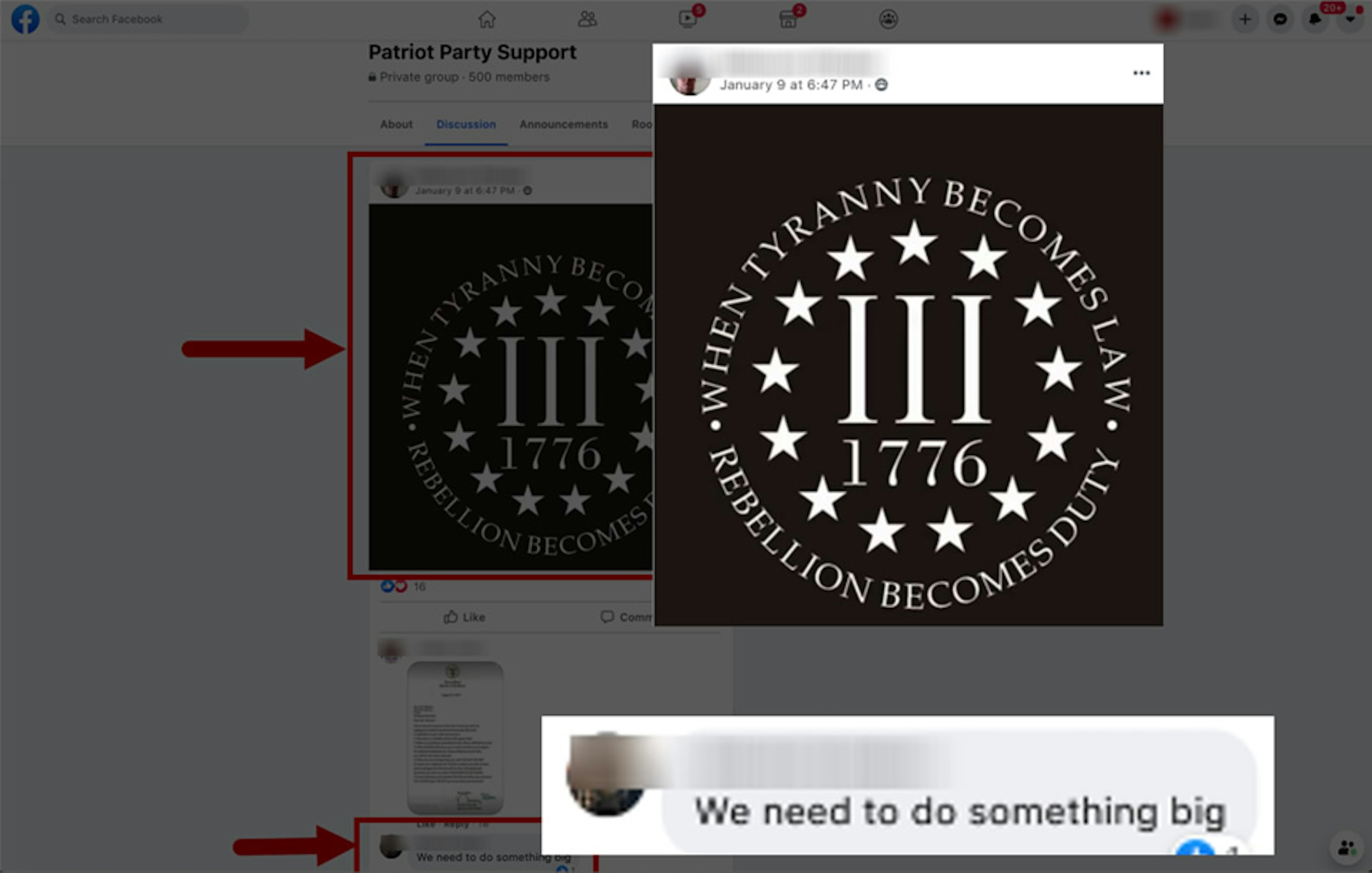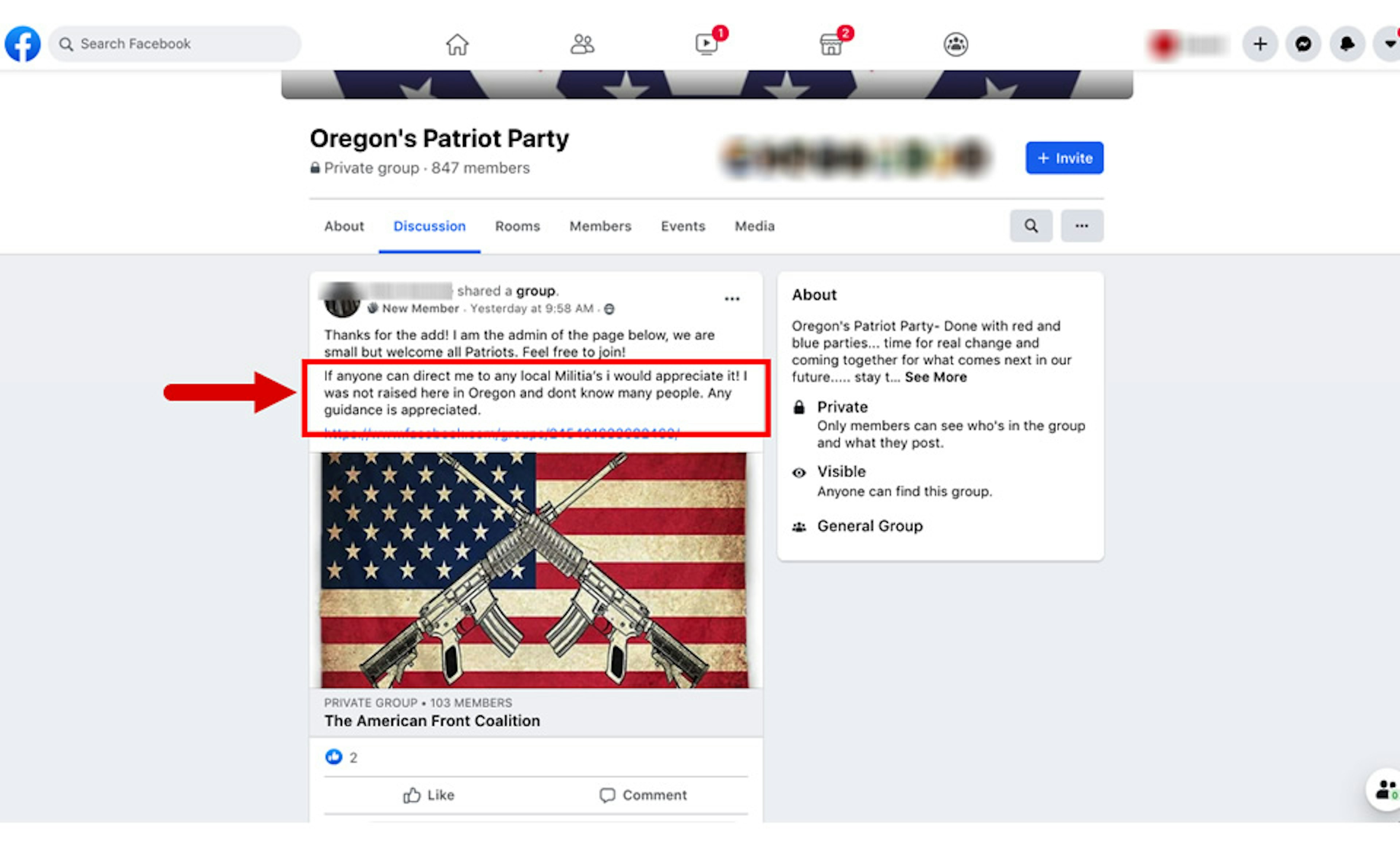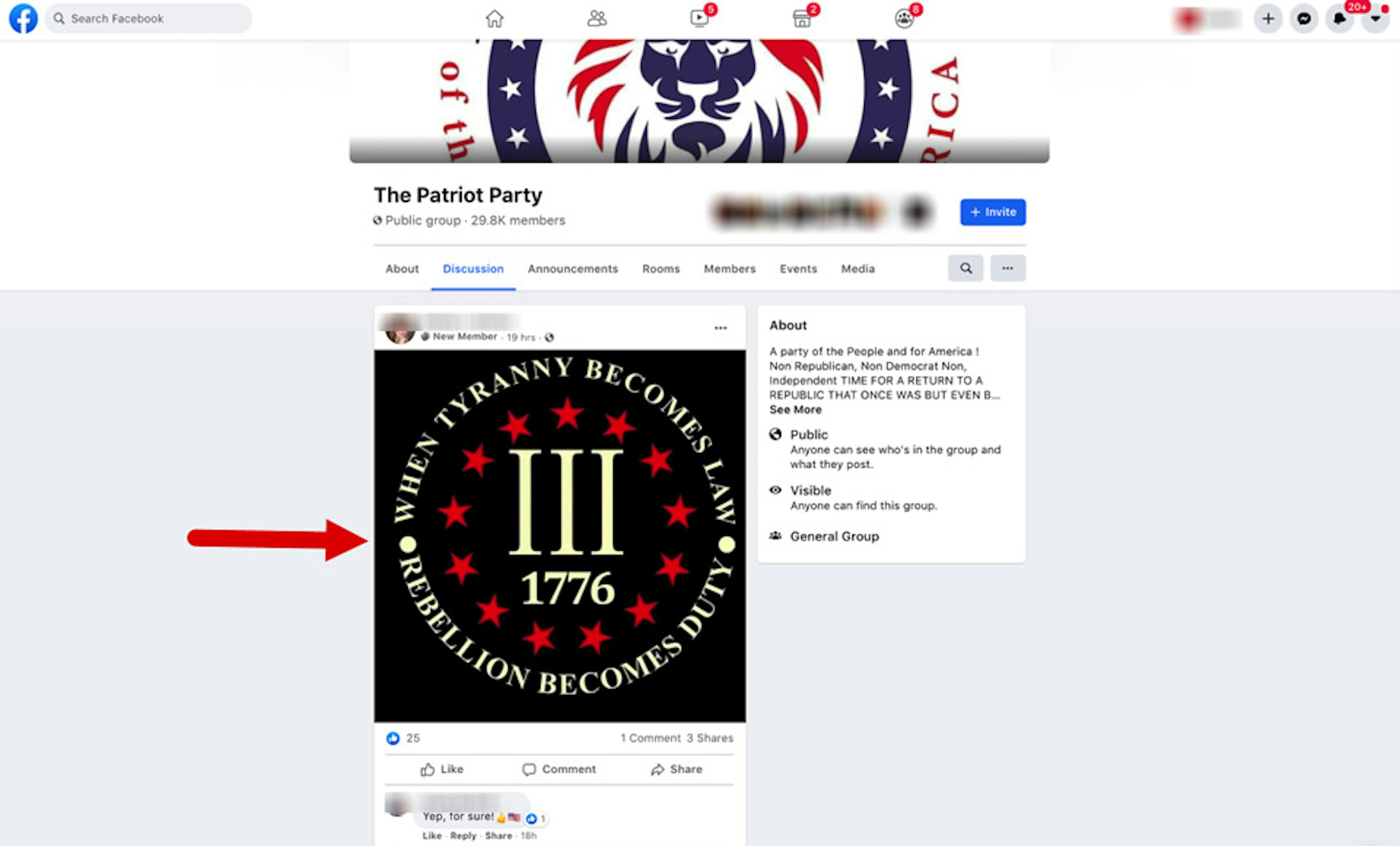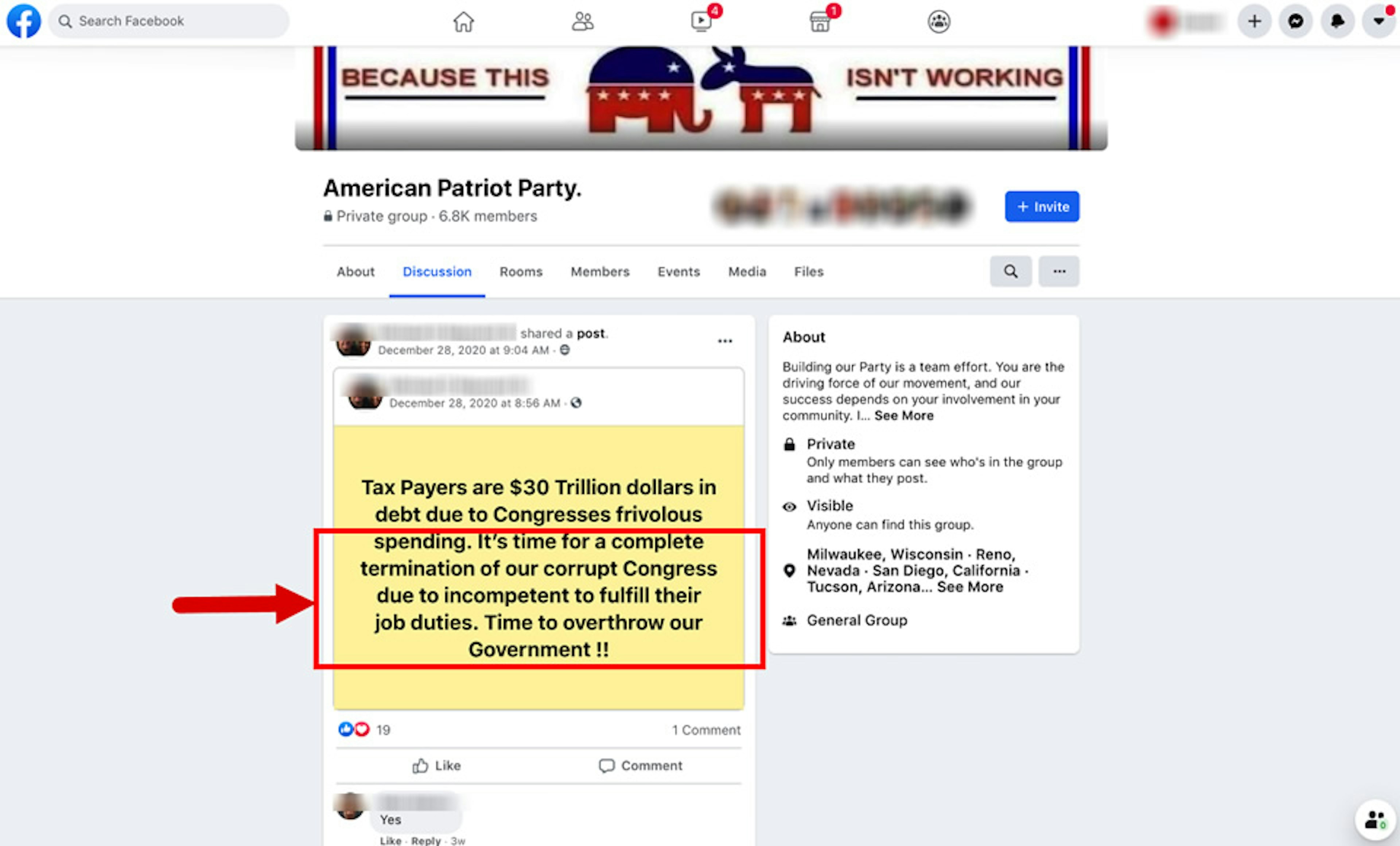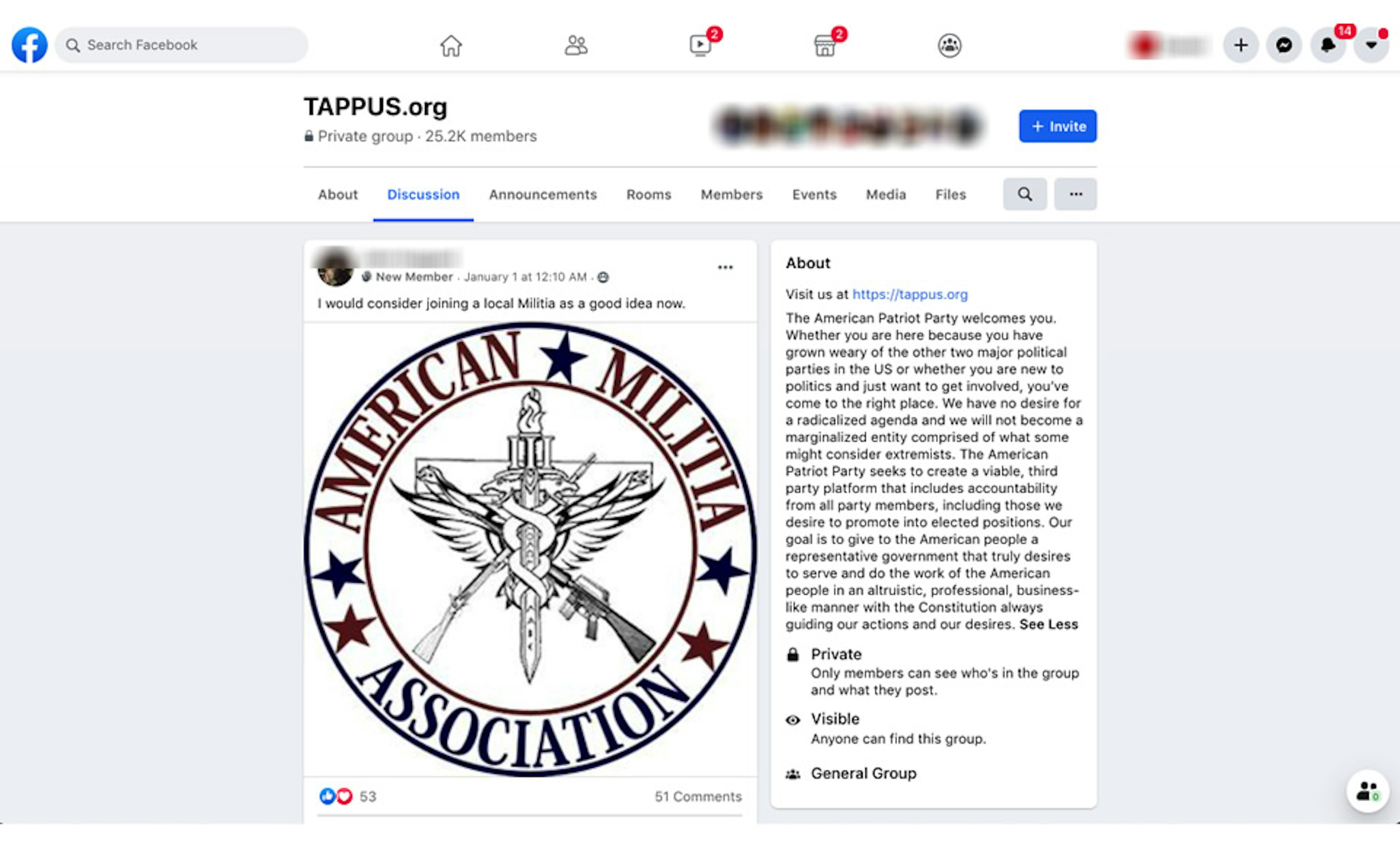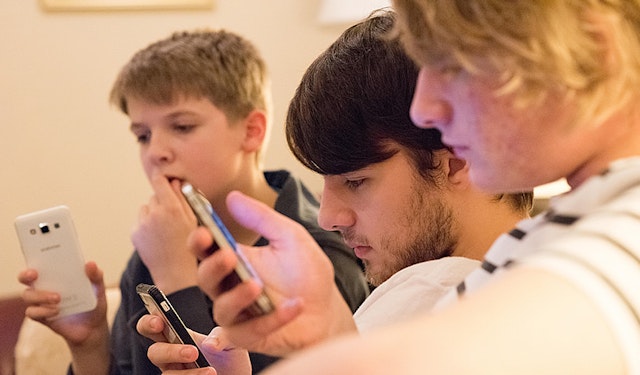Facebook is allowing a far-right, pro-Trump “Patriot Party” movement to take root on its platform, combining elements of militia activity and election conspiracy theories, according to research by the Tech Transparency Project (TTP), which highlights Facebook’s continuing problems removing dangerous and misleading content from its platform.
Donald Trump, frustrated by what he viewed as insufficient Republican backing for his effort to overturn the election result, reportedly held discussions about forming a new Patriot Party during his final days in the White House. But TTP found that many Trump followers have already taken up that mantle on Facebook, forming an extensive array of “Patriot Party” groups and pages on the social network.
The effort so far appears to be largely decentralized, but is spreading rapidly, with some groups gaining thousands of members in just days. Many Patriot Party groups have adopted a common symbol associated with white nationalism and are filled with talk of organizing local militia and overthrowing the government. Some of the groups arranged transportation for people to attend “Stop the Steal” rallies in Washington, D.C., including the event that led to the deadly Capitol riot.
The activity is a worrying new sign of Facebook’s problems dealing with emerging threats on its platform. Facebook suspended Trump after the Capitol riots, but as TTP recently documented, the social network for months allowed far-right extremism, militia activity, and Trump-driven election conspiracy theories that fueled the insurrection.
The proliferation of Patriot Party groups closely mirrors the spread of the so-called boogaloo movement on Facebook that TTP first observed last spring. (Boogaloo supporters believe a second Civil War is coming.) As with the boogaloo movement, Patriot Party groups have used Facebook to coordinate activities, set up local chapters, and talk about violently toppling the current government system.
The Patriot Party dynamic also shows that Facebook, with its vast reach, remains an unparalleled organizing tool for right-wing groups, despite recent moves by many Trump supporters to embrace ideological fringe sites like Parler and Gab.
Here are some of the key findings from TTP’s investigation:
- TTP identified 51 Facebook Groups and 85 Facebook Pages that include “Patriot Party” in their name or use iconography that’s come to be associated with the movement. Roughly two-thirds of the groups and more than half of the pages were created after the 2020 election.
- Some Facebook Patriot Party groups have gained thousands of members in a matter of days.
- As with other kinds of online extremism, Facebook’s algorithms have helped to drive the growth of the Patriot Party movement by recommending content to users through its Related Pages feature.
- Many Patriot Party groups have adopted a lion’s head symbol originally associated with the white nationalist group VDARE. Trump retweeted a campaign video that used the symbol in 2019.
- Patriot Party Facebook groups helped organize “Stop the Steal” marches in Washington, D.C., starting in December. Members of these groups have maintained the extremist rhetoric since then, including a call to block Biden’s inauguration.
- The deep militia roots of many Patriot Party groups echoes the activity of some European far-right organizations, which have cultivated both political and paramilitary elements.
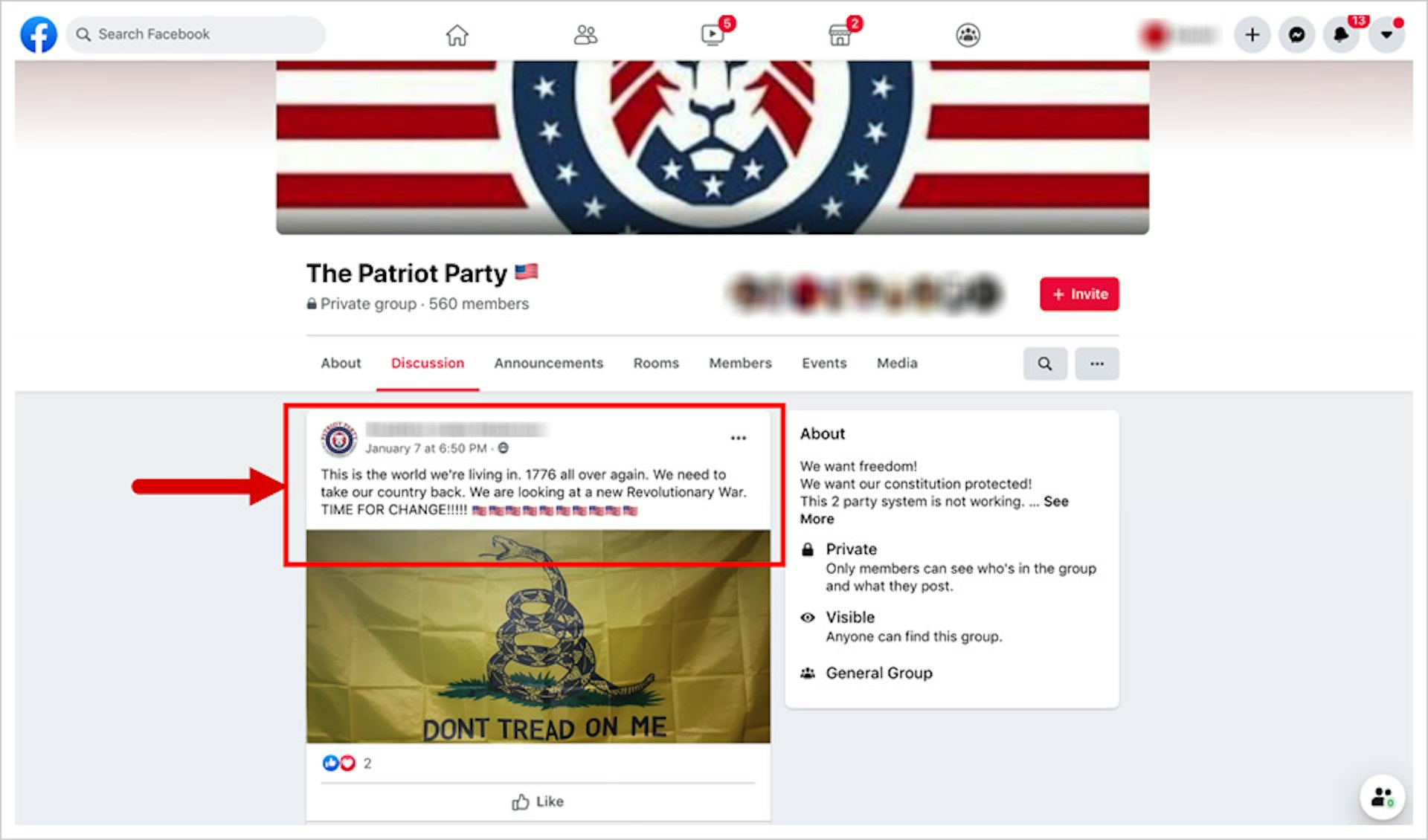
Rapid Growth on Facebook
TTP’s investigation identified 51 Facebook groups and 85 Facebook pages that had names or iconography linking them to the so-called Patriot Party. The vast majority of these were created after Trump lost the 2020 presidential election.
The groups collectively had 90,420 members as of Jan. 20, while the pages had a total of 31,555 “likes.” Some of these groups quickly amassed large followings. One group called “Patriot Party,” created on Jan. 17, gained 105,000 members in eight days, before it was removed by Facebook. Another group called “The Patriot Party,” created on Jan. 9, racked up 2,500 members in 10 days. Many of the Facebook pages grew rapidly as well: One page featuring the Patriot Party-linked lion’s head logo generated 693 “likes” in just three days.
TTP found that 67% (34) of the Patriot Party Facebook groups were created after the 2020 election. Of those, 14 were created on or after Jan. 6, the day of the U.S. Capitol riot. Nearly half—44% (37)—of the Patriot Party pages were also created on or after Jan. 6. A number of the state-focused pages, such as “Patriots Party of Georgia,” “Patriots Party of Indiana,” and “Patriots Party of Tennessee,” carry matching images and share the same posts, suggesting they were created by a single user or organization.
Roughly 37% (19) of the groups included iconography affiliated with the Patriot Party movement, most commonly the lion’s head, in their cover photos. More than half—58%, or 49—of the pages featured these images as well.
Inside these groups, members openly recruit for local militias and exchange information on military tactics, radio communication, and training opportunities, despite Facebook’s ban on “militarized social movements.” Some of the groups organized transportation and accommodations for “Stop the Steal” events in Washington. Even after the Jan. 6 riot at the Capitol, members of these groups have continued to openly engage in militia recruitment and discuss overthrowing the government.
One post in the Facebook group ‘THE PATRIOT PARTY” on the evening of Jan 6, after the Capitol riot, declared “it’s time for good men to do Very Bad Things.” The post generated hundreds of replies from members expressing support, with comments like “locked and loaded” and “let the civil war begin.” One user even replied with martyrdom talk: “I’m ready to sacrifice my life.” (TTP recently found similar martyrdom rhetoric in a far-right group on Facebook.)
Among the groups and pages identified by TTP that were created prior to 2020 election, most had right-wing origins but recently changed their name to reflect a new Patriot Party affiliation. For example, one 1,320-member group adopted the name “American Patriot Party” on Jan. 8, two days after the Capitol insurrection. The group, originally established in April 2016, was previously called “D.C. Swamp Drainers Trump-Pence Landslide 2020.”
TTP found that Facebook’s algorithms recommend Patriot Party pages to users who show an interest in such content, likely contributing to the growth of the movement. If TTP’s monitoring account “liked” a “Patriot Party” page, Facebook’s “Related Pages” feature often pointed to similar pages. TTP discovered the same dynamic with white supremacist content last year, raising concerns that Facebook is contributing to an echo chamber of radicalization.
One of the pages identified by TTP even had a Facebook shop selling Patriot Party-branded merchandise. The shop is an in-app storefront that allows page managers to sell things like T-shirts and stickers to users without forcing them to leave the page. Facebook takes a fee for items sold through these shops in the U.S., meaning the company is profiting off the Patriot Party movement.
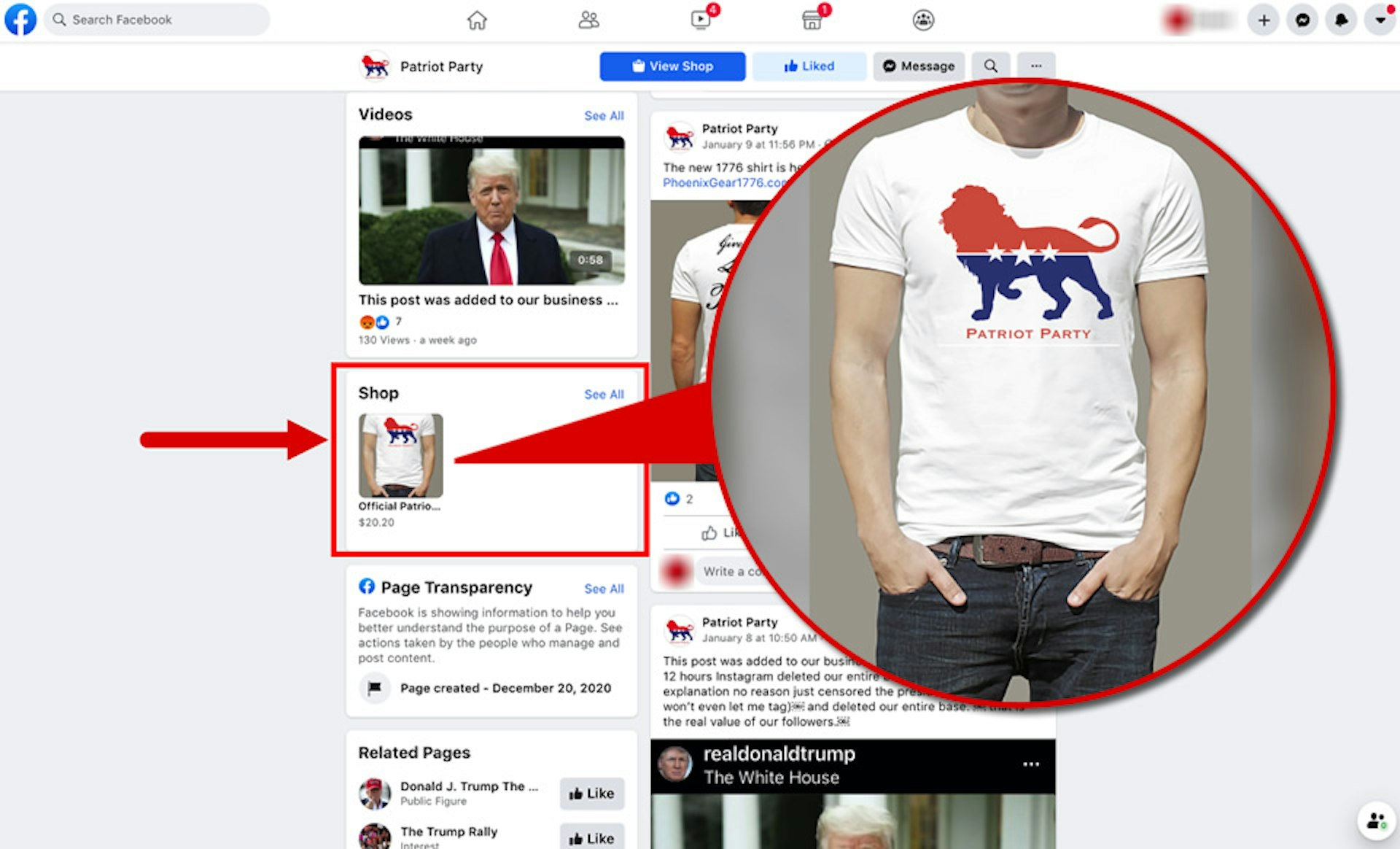
Since Jan. 20, when TTP conducted its initial count, Facebook has removed some of the Patriot Party groups and pages in a piecemeal fashion, but dozens of others remain active on the platform.
Organizing Structure
Facebook Patriot Party groups played a significant role in “Stop the Steal” rallies that culminated in the Capitol insurrection.
One example of this activity is Pat King, the host of “Patriot Party Podcast” and administrator of the Facebook group “Official Patriot Party.” (The Facebook group and the podcast, available on Apple and Google Play, feature the same logo, a red and blue graphic eagle.)
“Official Patriot Party,” a public Facebook group created on Nov. 13, described itself as “a group of Patriots who are sick of just talking and are committed to taking back our Constitutional Republic.” The group’s “about” section laid out its mission, which included “providing ground support for MAGA Marches, coordinating events & support for Patriots from all over the country attending events. Guides, Escorts, Security, Lodging & Transportation.” The group said it also helps supporters create “subgroups in their areas.”
The public group directed users to two recommended, private Facebook groups, “Patriot Party Support” and “PATRIOT PARTY CONNECTIONS (MAGA).” King served as a primary administrator of all three. The groups in this network heavily promoted “Stop the Steal” events in Washington, including an event page for a Dec. 12 rally hosted by King and the “Official Patriot Party” group. King coordinated with members about accommodations for the event, offering a group rate for rooms at the Hilton hotel in Arlington, Virginia, just outside Washington, under the organization name “Patriot Party.”
“Official Patriot Party” promoted other pro-Trump rallies, including the Jan. 6 event at the U.S. Capitol. Two days before the Capitol riot, some members of the Facebook group engaged in violent talk. One wrote:
The first wave to begin arriving and if “HARM” comes to any of our American Patriot you will witness wave after wave of “US” to defend them and uphold our American Constitution, “We the People” will never “Surrender nor Retreat”, we are not Antifa nor BLM We are the People, election Fraud Ends NOW! Audit all legal ballots for this is an ACT OF WAR against America and a treasonous act.
King, in a Dec. 31 episode of his podcast, also appeared to anticipate violence. “Just know that tensions are going to be high that day. … I would leave the kids at home this time,” he warned listeners, adding that Jan. 6 “should be an amazing event, and I'm sure it will be and I'm sure everything will go off."
In the days after the Capitol insurrection, members of these Facebook groups continued posting militia content and threats of violence. On Jan. 9, a member of the “Patriot Party Support” group shared the logo of the Three Percenters anti-government militia, whose followers have been charged in connection with the riot. Another member replied, “We need to do something big.”
Facebook later removed “Official Patriot Party” and its two affiliated private groups. Under pressure following the Capitol riot, the company on Jan. 11 announced it would remove content containing the phrase “stop the steal” from its platform because of its connection to the violence in Washington.
Patriot Party Symbolism
The Facebook groups and pages identified by TTP use a specific set of logos and images to represent their “Patriot Party” affiliation.
The most common iconography is a red, white, and blue lion’s head in a circular logo surrounded by stars. Other frequently used symbols are a red, white, and blue graphic of colonial man meant to resemble a patriot; a blue and red side profile of a lion’s body with white stars across the center; and a red and blue graphic eagle.
President Trump retweeted an amateur campaign video in 2019 that featured the circular lion’s head, a symbol that originated with the hate website VDARE and the “Lion’s Guard,” a pro-Trump vigilante group.
The Southern Poverty Law Center has designated VDARE as white nationalist and describes it as an “anti-immigration hate website,” while the “Lion’s Guard” was a self-styled “militia-style security force for attendees at Trump rallies,” according to a 2016 report from Bloomberg News. (The Lion’s Guard Facebook page, which is still active as of Jan. 29, promotes a quote from Italian dictator Benito Mussolini.)
Facebook has cracked down on VDARE, removing a network of pages, accounts and groups linked to the website in spring 2020 for violating policies against “coordinated inauthentic behavior.” But the lion’s head symbol is enjoying a new wave of popularity with the Patriot Party movement.
The symbol also featured in the Capitol insurrection, with at least one rioter carrying a flag emblazoned with the circular lion head.
Paramilitary Features
Patriot Party groups on Facebook have deep militia connections. Many of the administrators of these groups, as well as individual members, openly flaunt their association with militias, despite Facebook’s ban on “militarized social movements.”
For example, the administrator for the group “Patriot movement of America” features the logo of the Three Percenters in his Facebook profile. Meanwhile, the admin for the Facebook group “United Patriots of Arizona” expresses supports the Oath Keepers, another anti-government right-wing militia. (Followers of the Oath Keepers have also been charged in the Capitol violence.)
One member of “United Patriots of Arizona,” in a Dec. 24 post, called for organizing a militia and running a training program with small security teams. The user’s profile cover photo prominently features the flag of the boogaloo movement.
Other signs of “patriot” militancy have been building for months. A Facebook group called the “Patriot Action Network,” which used the lion’s head symbol, was among a group of far-right and militia organizations that promised to “back up” police on Election Day against supposed antifa and Black Lives Matter protesters. (Facebook has removed the group, but its YouTube channel is still active.)
One of the accused Capitol rioters, Eric Munchel, famously nicknamed “zip tie guy” after researchers identified him as a man photographed with plastic restraints inside the Capitol, included the lion’s head logo on his Facebook profile. TTP gathered the images before Munchel was arrested for his role in the insurrection and his Facebook account taken down.
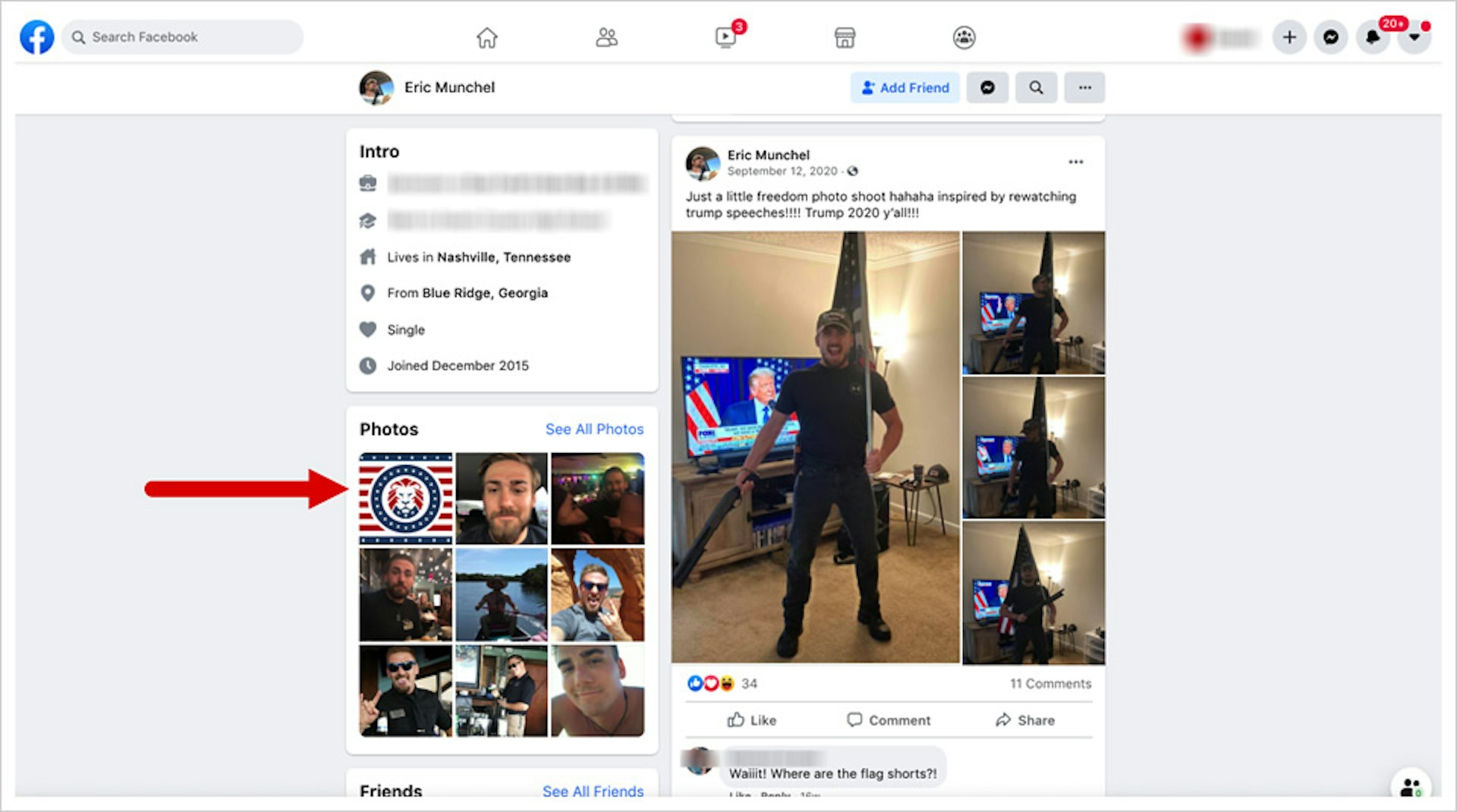
The threats continued after the insurrection. On Jan. 10, a user in the group “Official Patriot Party” targeted the inauguration, posting “HOW CAN WE STOP BIDEN FROM BEING SWORN IN??” TTP also identified a post in the Facebook group “Patriot Party” calling Jan. 20 Inauguration Day a “Tiananmen Square moment” for patriots. After CNN reported on the post, Facebook took it down along with the offending group.
TTP’s investigation also found that Facebook is blocking the hashtag #patriotparty, with searches for the term generating a notice that says the results are hidden because some content associated with those posts “goes against our Community Standards.” It’s not clear why Facebook is blocking this hashtag while allowing various Patriot Party groups to exist on its platform.
Trump has given mixed signals on the Patriot Party. After he reportedly discussed the idea in the waning days of his term, the Trump campaign disavowed any connection with a fundraising effort by the Patriot Party. The Washington Post, however, has reported that Trump sees the third-party threat as leverage over Republican senators, to keep them in line during his impeachment trial.
If the “Patriot Party” ever becomes a true political organization linked to Donald Trump, the movement’s militia-fueled origins would put it in similar company with European far-right groups that have established both political and paramilitary arms.
In Ukraine, for example, the far-right militant Azov movement, which is known for training white supremacists from around the world, has its own political wing. Facebook, which banned the group more than a year ago, has struggled to get it off the platform, with reports detailing how Azov is continuing to use Facebook for organizing and spreading its ideas.
Elsewhere in Europe, Hungary’s right-wing Jobbik political party founded a uniformed vigilante group called Hungarian Guard that has patrolled local Roma populations. Militia groups affiliated with Germany’s extreme-right National Democratic Party, meanwhile, patrol German cities, including neighborhoods with large numbers of immigrants.
In the U.K., the far-right group Britain First, which calls itself a “patriotic political party,” has been deemed a “pseudo-paramilitary group.” The group developed patrol units to target Muslim communities, and made heavy use of Facebook to attract followers. Facebook banned Britain First in 2018 for posting “content designed to incite animosity and hatred against minority groups,” but the group has been active on the platform since then.
A Familiar Pattern
Facebook has been slow to deal with the expanding “Patriot Party” movement on its platform, despite the fact that it fuses together anti-government militia activity and Trump-fueled election conspiracies—two things Facebook has promised to remove.
It’s another troubling sign of the social network’s problems recognizing new threats. The stakes are especially high, given how social media-driven radicalization fueled the U.S. Capitol riot.
The Patriot Party groups and pages proliferating on Facebook appear to be largely decentralized, even as they adopt common symbols and extremist language. Trump remains suspended from Facebook, with his fate now in the hands of the company’s Oversight Board, but if he decides to form a Patriot Party political organization, he’ll have a militarized Facebook following ready to join the cause.
